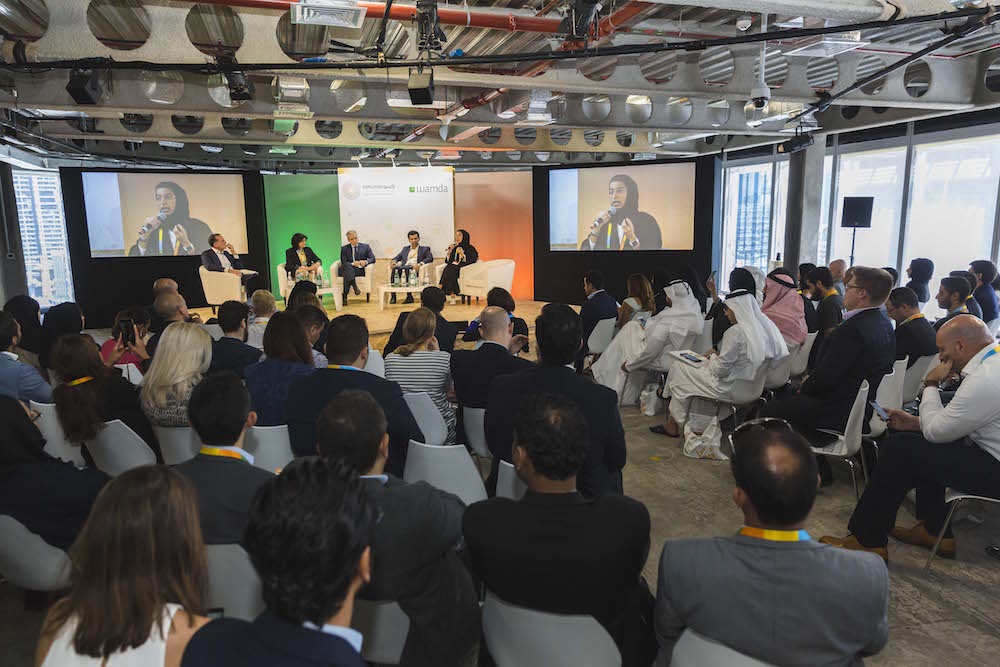Startup and corporation collaboration gets a boost #Expo2020xWamda

Corporation, big business, multinational, mega-corp - whatever noun you prefer to use, they need you, and by ‘you’ we mean startups, small businesses, one-man-shows.
“It’s no longer a matter of being better for business or helping a client, it’s a matter of survival now, we can’t ignore the innovation of startups,” said Nadim Najjar, MENA managing director for Thomson Reuters, a convert to the concept of collaborative entrepreneurship (CE).
Collaboration between startups and corporations is not new but in the Middle East it’s needed a boost.
In May, at a location next to the Burj Khalifa in Dubai, Expo 2020 Dubai and Wamda held the region’s first summit that brought together a select group of startups and corporations, whilst also examining the achievements of this new collaborative approach so far.
Fifteen MENA startups, working in everything from robotics to virtual reality, exhibited their business in the ‘Creativity Café’ - a room overlooking the Burj Khalifa Lake. Suits mingled with jeans and jackets as startups and corporates got to know each other a little better.
The partnership between Expo 2020 Dubai and Wamda, which was launched in January this year, aims to bring regional startups and corporations together.

Changing the dynamic
“It is not where big meets small, it’s where big eats small. We are trying to change that today.” This was how Her Excellency Reem Al Hashimy, UAE Minister of State for International Cooperation and Director General Bureau Dubai Expo 2020, succinctly explained the theme of the one day summit.
US startup Soofa, which makes outdoor furniture with inbuilt solar panels that provide charging stations and environment monitoring in public places, has yet to sign up with a corporation, but founder Sandra Richter was keen to stress some lessons they had learnt so far.
“When it starts to feel gooey, I step back,” said Richter, who sat on the panel discussing regional and international success stories and best practices in CE. Or, when things are moving too slowly for a startup and it doesn’t seem like people are passionate about the CE project anymore, give it up.

Successes so far
Hussein Wehbe, Aramex’s general manager for UAE, said CE was already part of their internal culture, thanks to partnerships with startups like Sheaply, Mumzworld and The Happy Box.
Speaking about the latter he said: “When she [founder Jumana Al Darwish ] was going global we were able to support her in going to other markets.”
Of course it’s not a case of simply walking up to a big company and saying ‘let’s do business’.

Mumzworld founder Mona Ataya, who has made long term and short term alliances with corporates, said she made her approach to logistics company Aramex by being strategic and mission-driven, as opposed to concept-focussed.
She told the listeners during the panel looking at lessons learned by early adopters of CE, the questions a startup should be asking themselves were: “What can we as bring to the table that is unique and different?” and, “What can the corporation give us for scaling, faster and further?”
Fatma Al Khoori, founder of Dubai gift wrapping startup Maska, was also on the panel. She said collaboration with global luxury brand LVMH and Aramex had opened many doors.
“Mentorship from corporates has been of great use to us,” she told the audience. “I didn’t know what I was doing, guidance was so important.”
Pitching
No startup event could go ahead without some pitching.
A total of 22 startups pitched to corporates within the tracks of mobility, opportunity and sustainability.

The startups were largely looking to talk with corporations that could help them with anything from regional expansion, support in marketing and distribution of their product, to oil companies, and car manufacturers to partner with.
Then seven corporations, including Visa, Air Arabia and retail and leisure holding company Majid Al Futaim, pitched themselves to a crowd of startups, each looking for a startup to aid them in innovation.
Panel moderator Christopher Schroeder announced that he was no longer a CE skeptic and closed his discussion with a prediction: “You [MENA] won’t be talking about this being a nascent ecosystem [for much longer] you’re the vanguard that are going to take this ecosystem to the globe.”


